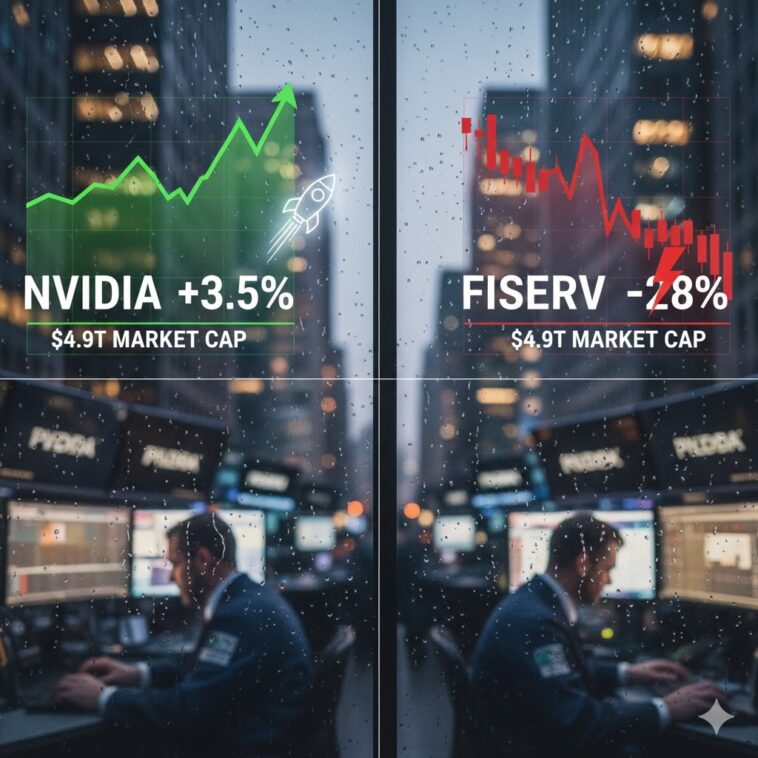Q3 Earnings Volatility Roils Equities: A Market of Extremes
Stark divisions defined Wednesday’s Q3 Earnings Volatility, as the market reacted violently to the latest wave of corporate report cards. On one side, Nvidia’s relentless rally put a never-before-seen $5 trillion market capitalization within sight. On the other, disastrous results from Fiserv and a disappointing loss by Boeing demonstrated that not everyone is participating in the exuberance. This, quite clearly, is a bifurcated market.
Nvidia’s shares climbed another 3.5% in premarket trading, extending the rally that had already pushed the chipmaker up by roughly 5% in the prior session. The move brings it closer to that historic $5 trillion milestone, a marker no company has ever reached before. The surge suggests that investors are not only buying the company’s current growth story but are doubling down on the future of artificial intelligence.
The Unstoppable Ascent of AI-Adjacent Tech
It wasn’t just the headliners that benefited from the AI wave. The rising tide lifted several adjacent technology boats. Seagate Technology, a key player in data storage, added 6.6% after decisively beating Wall Street’s revenue and adjusted earnings estimates for its fiscal first quarter. Similarly, Teradyne, a supplier of complex test and robotic systems, surged an astounding 20.5% on a positive report and an even better outlook.
“The $5 trillion market cap for Nvidia is less a valuation question and more a psychological barrier,” said Cassandra Hayes, Global Strategist at Zenith Capital. “It signals to the world that AI is not just a cycle; it’s a fundamental, long-term paradigm shift, and Nvidia is still the clear kingmaker in this landscape.”
Industrial Strength vs. Consumer Pain
Elsewhere, the industrial economy showed surprising muscle while consumer-facing sectors struggled. Heavy equipment titan Caterpillar rose 4% after delivering better-than-expected results, a clear sign that global infrastructure and mining investment remains robust. The firm’s $4.95 adjusted earnings per share easily surpassed the $4.59 analysts had penciled in.
Healthcare also offered some resilience, with managed care provider Centene jumping 10%. The company not only delivered a surprise profit—50 cents per share versus an anticipated 14-cent loss—but also raised its guidance. TE Connectivity also popped 4.4% on a strong quarter.
However, the consumer was conspicuously absent from the party. Pharmacy giant CVS Health slipped slightly after reporting a hefty third-quarter net loss of nearly $4 billion, a stark reversal from the $71 million net income it posted a year prior. And snack maker Mondelez slid 5.5% after taking the knife to its full-year organic revenue growth forecast, lowering it from 5% to a more cautious 4%. The market seems to be saying: building things is strong, but selling small, everyday items is getting harder.
Boeing’s Deep Loss and the Brutal Plunge
The most painful market moves belonged to those with critical misses and slashed outlooks. Aerospace behemoth Boeing had a particularly volatile day. Despite reporting revenue of $23.27 billion—comfortably above the consensus—the firm posted a whopping adjusted loss of $7.47 per share, significantly deeper than the $4.59 loss analysts had feared. While commercial jet demand is high, production bottlenecks and charges related to defense contracts are clearly weighing heavily on the bottom line.
But the real trauma was reserved for Fiserv. The financial services tech company plunged 28% in what amounted to a rout after a massive earnings miss. The firm’s adjusted earnings of $2.04 per share and revenue of $4.92 billion both fell well short of the Street’s high expectations. Compounding the pain, the company sharply slashed its full-year earnings guidance.
“The market simply doesn’t forgive when a growth story becomes a guidance cut,” explained Dr. Elias Vance, Senior Equity Analyst at Ridgegate Investments. “Fiserv wasn’t just short; they cratered expectations, and the resulting 28% haircut is the brutal price of that disappointment.”
Other losers included generator manufacturer Generac, which dropped 9% on a weaker-than-anticipated report, and Caesars Entertainment, which fell nearly 8% after its quarter disappointed investors with a deeper loss than expected.
The Verdict on Selectivity
Wednesday’s trading confirms a pivotal trend: investors are displaying extreme selectivity. They are willing to reward strong execution—especially in AI-adjacent sectors—with astronomical valuations, yet they punish even marginal misses or cautionary outlooks with swift, heavy selling. This is not a broad-based rally; it’s a zero-sum game where only the flawless are celebrated. With companies like Enphase Energy tumbling 11% purely on weak revenue guidance—despite a quarterly beat—the bar for management teams has never been higher.
“Expect this highly discerning environment to continue,” Vance concluded. “Cash flows, margins, and most of all, the forward-looking statement—these are the new market battlegrounds. Everything else is noise.”



